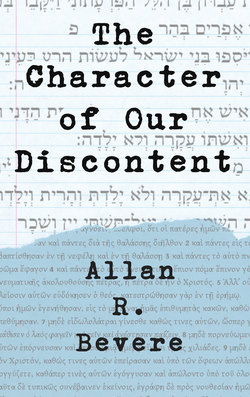Читать книгу The Character of Our Discontent - Allan R Bevere - Страница 3
На сайте Литреса книга снята с продажи.
ОглавлениеPreface
The chapters of this book were first spoken. They were sermons written from two convictions. The first is that the Old Testament is relevant and authoritative in the same way as the New Testament. While most Christians would acknowledge the truth of that claim, for all practical purposes, the Old Testament is often treated as an appendix to the New Testament, even though it comes first. It must not be forgotten that what Christians call the Old Testament were the Scriptures of Jesus and Paul. They drank deeply from the well of its wisdom. They quoted from it. Jesus embraced it and utilized its narratives in word and in symbolic deed to display the nature of his ministry on behalf of Israel. Paul too saw the story of Jesus in its pages, and was the first major Christian thinker to reflect on its implications. Without the Old Testament, there would be no New Testament. Like our Lord and that great Apostle to the Gentiles, we too must drink deeply from that same well of wisdom.
The second conviction that gave birth to these sermons is that pastors do not preach enough from the Old Testament, myself included. In looking back over the Scriptures I had chosen to preach on over a period of a few years, I was frankly embarrassed at how little I had worked in the texts of the Old Testament. These sermons were an attempt to remedy that situation.
Being a full time pastor and an adjunct professor, I live in two worlds. The former is the world of generalization in many areas of study. The latter is the world of specialization. My training is not in Old Testament, though as a pastor I preach from it and teach it. While I understand why specialization is important in academia, I also find it unfortunate that the scholarly community has become so overly specialized, that it is almost an unpardonable sin to think that someone trained in New Testament can write in the area of Old Testament studies, and those trained in Old Testament can trespass into the domain of constructive theology. And God forbid that a theologian might write a commentary! It is almost as if a scholar's formal training type casts her or him into a certain role with a particular script from which there can be no deviation. The advantage I have in being an adjunct professor is that I am not limited by such boundaries. My formal training is in theological ethics and New Testament with recent years being devoted more to constructive theology, philosophy, and the relationship between theology and science. I have had no formal training in Old Testament other than the basic courses I took in seminary, but as a pastor I have preached and taught the Old Testament to church folk for over twenty-five years, and I have also done a fair amount of reading on the subject. So, while I have no doubt that plenty of others could have written something superior to this work, especially those who have spent their lives in the world of the Hebrew Scriptures, I have no hesitation in wading into the world of Old Testament homiletics. Indeed, in preparing and writing these sermons I found much enjoyment. That's really the only justification I needed for writing this book.
